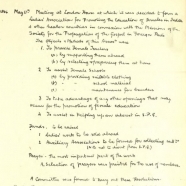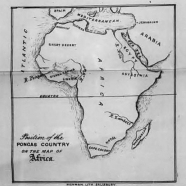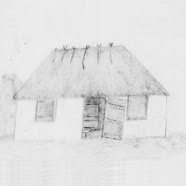The Society for the Propagation of the Gospel in Foreign Parts (SPG) (now named the United Society for the Propagation of the Gospel) was organized after Rev. Dr. Thomas Bray visited the American Colonies and found the Anglican Church there in disarray. He obtained a charter from King William III in 1701 to establish SPG as an organization authorized to send priests and schoolteachers to America to minister to the colonists and to “take the message of the gospel to the slaves and native Americans.”1
The SPG quickly expanded into the West Indies, Canada, New Zealand, Australia, and West Africa, and in the 19th century into India and South Africa. The Library’s access to British Online Archives includes a significant collection of SPG records from all of these locations.
American Material in the archives of the USPG, 1635-1812 Includes:
– letter books kept by the secretaries of the societies, consisting of copies of letters and papers from and to the missionaries appointed by the SPG to the American colonies and also from the colonial governors, private persons and churchwardens. Many of the originals are no longer extant.
– Index volumes for the letter books
– Published accounts of two early SPG missionaries to America
– Supplementary material from 1821-1828, which includes three volumes of copies of the most important letters (i.e., those read before the Society) and sent.

Australian records in the USPG archiveFiles relating to the establishment of the Society’s activities in the province of the Anglican Church of Australia and the development of an organization to support them. Includes:
– Unbound documents, subdivided by diocese: Adelaide, Melbourne, North Queensland, Perth, Sydney, and Tasmania.
– SPG Chapliancy services to emigrants, 1821-1864
– Copies of letters received and sent (from and to the Society in London)
– Indices to the Australian records
New Zealand & Polynesian records in the USPG archive Records relating to the early history of the Anglican Church in New Zealand and Polynesia. Includes:
– Files from the Melanesia Diocese, 1838-1958
– Files from the New Zealand Diocese, 1838-1875
– Copies of letters received and sent (to and from the Society in London)
– Indices to the New Zealand province records

Canadian Records in the USPG Archive, 1722-1952These papers chart the development of the United Society for the Propagation of the Gospel from its early days in Canada until its decline there. The majority of the reports included here are in fact narrative accounts submitted by members of the clergy working in various locations across Canada. Includes:
– Records relating to New Brunswick 1783-1857
– Records relating to Fredericton 1844-1860
– Records relating to Quebec 1793-1860
– Records relating to Montreal to c1860
– Records relating to Upper Canada 1788-1859
– Records relating to Toronto to c1860
– Records relating to Nova Scotia to c1860
– General records relating to Canada 1785-1864
– Reports for Canada, 1901-1950

Early Colonial and Missionary Records from West Africa
This resource comprises selected documents from microfilm collections, including: early Gold Coast records from the archives of the USPG; the papers of Thomas Perronet Thompson, the first Governor of the Colony of Sierra Leone; An account of two missionary voyages by Rev. Thomas Thompson; the letters of Rev. Philip Quaque, etc.
Gold Coast records from the archives of the USPG, 1886-1951
The period from 1903 onward is the most substantially documented in this collection. Records relating to the first 150 years are reproduced in both the Early colonial and missionary records from West Africa and the West Indies material in the archives of the USPG, 1710-1950. Includes:
– Copies of letters sent and received
– Committee of Women’s Work Correspondence
– Original letters from abroad, 1899-1933
– Missionary reports, 1906-1933
– Miscellaneous Gold Coast Papers, 1886-1951
South African archives of the USPG
United Society for the Propagation of the Gospel began its labors at the Cape of South Africa in 1821, the western division being occupied in that year and the eastern division in 1830. This collection from the Archives of the United Society for the Propagation of the Gospel, dates from their earliest connection with South Africa. Includes records for Capetown, Grahamstown, Natal, St Johns – Kaffaria, and Zululand.
West Indies material in the archives of the USPG, 1710-1950
Includes:
– Records from 1714-1908, divided into eight sections: the general archives and those appertaining to the Bahamas, Jamaica, Barbados, Antigua and the Leeward Islands, Trinidad, British Guiana and Honduras (Central America and the Mosquito coast).
– Copies of letters sent and received
– The Codrington Collection, 1704-1898
– Quarterly reports from missionaries, 1901-1950
– Papers of the Barbados Committee, 1710-1842
– Miscellaneous USPG contents

South Asian records of the USPG
Includes:
– Records beginning around 1770, during the period of the Society for the Promotion of Christian Knowledge (SPCK), and continue for some years after 1825, when the SPG accepted responsibility for the Danish and English missions in Tamil Nadu, as well as conducting its own work elsewhere in India.
– Copies of letters sent and received (to and from the Society in London)
– Annual reports of missionaries, 1840-1861
– Annual reports of missionaries, 1856-1900
– Selected Sri Lankan material, 1827-1867
– Miscellaneous additional materials
















